The secrets of the Passalacqua, the best hotel in the world
This 24-room 17th-century villa that ‘overflows with history and beauty’ on the shores of Lake Como in Lombardy, Italy, has been chosen as number one by ‘The World’s 50 Best’
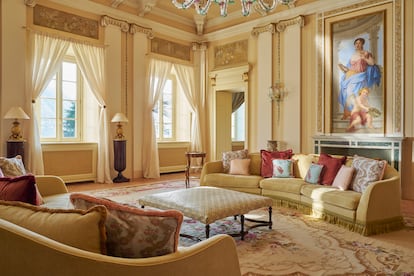
Just 36 miles separate the Milan Malpensa airport from the small municipality of Moltrasio, in northern Lombardy, Italy. The final stretch of the journey, from Cardano to our destination, runs along a road that draws arabesques between the Swiss border and the shore of Lake Como. Then, on the slopes of Mount Bisbino, famous for its gray stone quarries, the Passalacqua — the best hotel in the world, according to The World’s 50 Best — awaits behind a discreet fence, next to a Romanesque church.
Built on a plot of land that once belonged to Pope Innocent XI, the Passalacqua was part of the dependencies of the Monastery of the Humiliated, and saw the village of Moltrasio grow around it. It was a rustic castle at the foot of the old Roman road that housed an orchard and a garden, and in the 18th century it was transformed into a splendid baroque mansion, first owned by the Odescalchi family and a few years later by a local aristocrat, Count Andrea Passalacqua. The count put its expansion in the hands of the Luganese architect Carlo Felice Soave, and commissioned some frescoes, such as a Madonna with Child dating from 1790 that is attributed to Andrea Appiani.
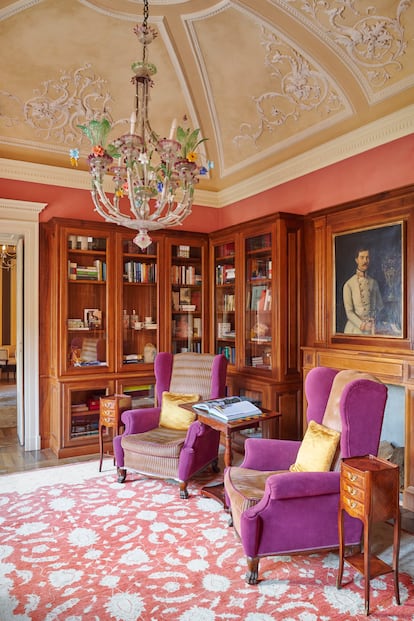
This place used to be frequented by the Lombard nobility and high aristocracy during the peak of the villeggiatura, the annual exodus in which the great Italian families embarked to spend a couple of months away from the city, enriching the soul and expanding the mind. Napoleon Bonaparte and Winston Churchill stayed here. Vincenzo Bellini, a guest of the villa between 1829 and 1833, wrote here his opera La straniera, as well as part of La sonnambula. For four years now, the Passalacqua has belonged to the De Santis family, which also owns the Grand Hotel Tremezzo, also next to Lake Como. The De Santis, the couple formed by Antonella and Paolo, along with their daughter Valentina, acquired the mansion and transformed it into a luxury boutique hotel spread out over three buildings (the main Villa, the Palazzo and the Casa del Lago by the lake) with 24 rooms of between 30 and more than 250 square meters. Opened in June 2022 as an exclusive residence, the new Passalacqua has just been named the best hotel in the world by The World’s 50 Best (this is the first time that this prestigious ranking, which rewards the best restaurants and bars in the world, has presented a list of the best hotels), above the Rosewood in Hong Kong, the Four Seasons in Bangkok, the Aman in Tokyo and the Soneva Fushi in the Maldives.
Early in the morning, a group of guests practices yoga next to the Palazzo, the pavilion that replaced the old corrals and stables. A couple, settled in the Villa’s lavish Blue Room, has some salmon, smoked herrings, caviar, tea, fresh cheese and apricot jam tart for breakfast. Delia Facchini, the hotel’s head of public relations, invites us to take a walk towards the pier, through the magnificent terraces with lily-petal parasols, the winter garden designed by JJ Martin, the swimming pool next to the rose garden and the laurel plantation.
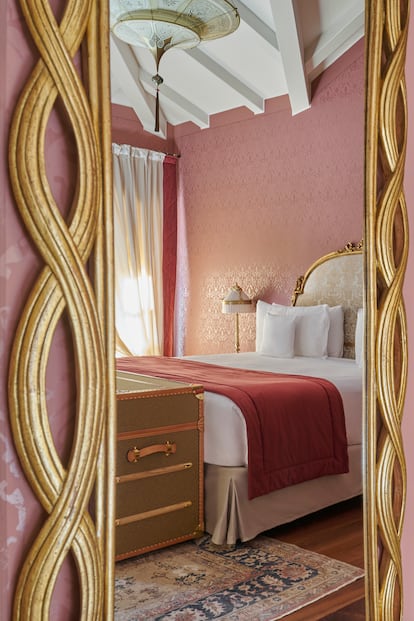
A few minutes later, Valentina de Santis welcomes us in the Bellini suite, the Passalacqua’s flagship accommodation, under a Murano glass chandelier made by the Barovier & Toso workshop, between Fortuny silk lampshades, Chinese porcelain vases, Cotto Lombardo tiles, Rubelli fabrics and Breccia Pontificia marble bathrooms. “My parents and I fell in love with this place the moment we were lucky enough to discover it,” she says. “There are several famous mansions at Lake Como, which are totally or partially open to the public, from Villa Carlotta to Villa d’Este, but the Passalacqua was a private space that could be glimpsed from the top of the Moltrasio hill or from the other shore, but very rarely visited.” Finding out that it was for sale was “a very pleasant surprise” for this family. They acquired it at auction “against all odds,” according to De Santis; they thought it was very likely to “end up in the hands of some large international investment fund.”
As soon as they took possession of this place that “overflows with history and beauty,” they devoted “three very intense years to renovate and prepare it, taking special care not to alter its exquisite atmosphere or distort its essence.” For the businesswoman, it was essential that every last detail, “from the color palette that dominates in each of the rooms, to the finishes, the furniture, the antiques, that perfectly tuned piano in the corner, the frescoes of that vault,” had a coherence, an identity, “told a story.” De Santis feels understandably proud that the “conceptual residence” to which she has devoted so much time and effort has been named the best hotel in the world. She believes that behind the award there is a deliberate search for “a concept of contemporary luxury that is not based on ostentation, but on the ability to provide experiences.” Only that would explain why The World’s 50 Best chose “a recently opened family business that is relatively modest when compared to the other nominees.”
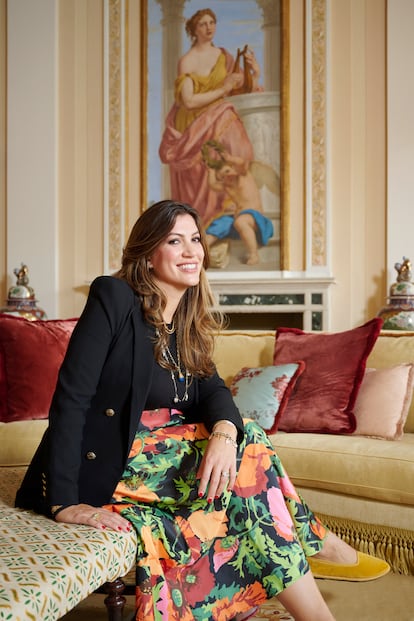
Silvio Vettorello, general manager of the Passalacqua and the Grand Hotel Tremezzo, attended the London gala with De Santis and ended up collecting an award that they did not expect “at all,” as being among the 50 finalists already was a dream come true: “I guess they had to mop the floor to dry our tears,” he jokes. For him, more than a boutique hotel, the Passalacqua is “a home away from home where we offer guests experiences that are as simple as they are unforgettable.” “They are invited to enter the kitchen to chat with our chef about traditional Italian and Lombard cuisine recipes, read a book in the shade of a laurel tree, meditate among rose bushes at dawn, pick cherries or peaches from our orchard, sail the lake aboard one of our boats, listen to a Bellini opera in the same place where it was written,” he says.
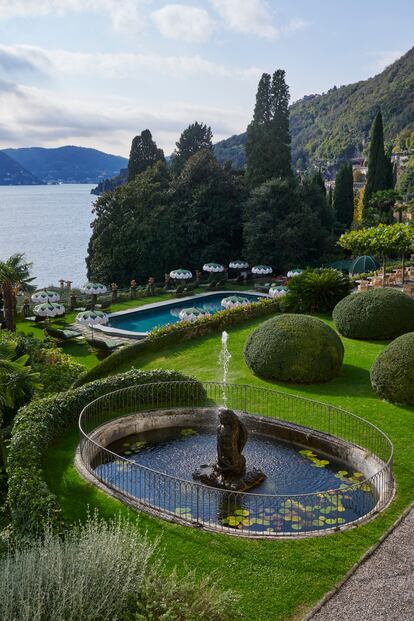
The hotel bar is Stefania’s domain; she is a master mixologist and the author of many delicacies with local roots. The kitchen, meanwhile, is ruled by the Neapolitan chef Alessandro Rinaldi, an eloquent conversationalist who is committed to “reinterpreting popular cuisine recipes using local ingredients and giving them a personal touch of innovation and fantasy.” As per his advice, we tasted an impressive ossobuco with mushroom sauce, some pappardelle with white wine and some perfect macarons that bring back a flood of childhood memories to the palate, as happens to the food critic in the movie Ratatouille. At the end of the day, it’s just one more example of the sensations that a day by the shores of Lake Como provides when you are in the best hotel in the world.
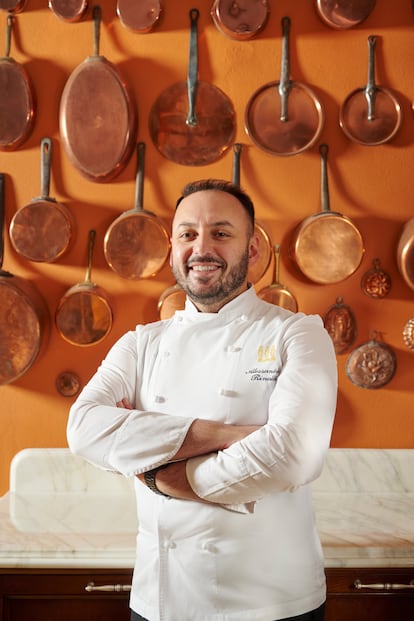
Sign up for our weekly newsletter to get more English-language news coverage from EL PAÍS USA Edition
Tu suscripción se está usando en otro dispositivo
¿Quieres añadir otro usuario a tu suscripción?
Si continúas leyendo en este dispositivo, no se podrá leer en el otro.
FlechaTu suscripción se está usando en otro dispositivo y solo puedes acceder a EL PAÍS desde un dispositivo a la vez.
Si quieres compartir tu cuenta, cambia tu suscripción a la modalidad Premium, así podrás añadir otro usuario. Cada uno accederá con su propia cuenta de email, lo que os permitirá personalizar vuestra experiencia en EL PAÍS.
¿Tienes una suscripción de empresa? Accede aquí para contratar más cuentas.
En el caso de no saber quién está usando tu cuenta, te recomendamos cambiar tu contraseña aquí.
Si decides continuar compartiendo tu cuenta, este mensaje se mostrará en tu dispositivo y en el de la otra persona que está usando tu cuenta de forma indefinida, afectando a tu experiencia de lectura. Puedes consultar aquí los términos y condiciones de la suscripción digital.









































